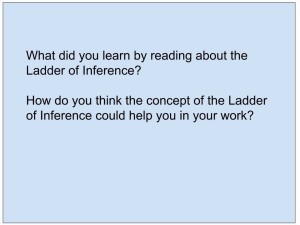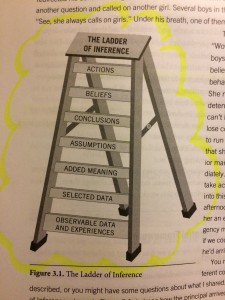Is Your Mind Getting in the Way?
One of the greatest qualities of an educator is their will to never stop learning. No matter how long one has been in education, you can find an educator seeking out new opportunities to learn and connect with others in their field.
The world of technology has allowed educators across the globe to connect and continue the learning marathon! Voxer is one tool educators are using to take the the conversation deeper and more personally with each other.
Last year, I was blessed to connect with other instructional coaches (or “Teacher on Special Assignment”/ TOSA as some districts refer to them) via the Voxer app. Through our conversations we decided we wanted to go on a learning journey together through a book study. We heard of a fantastically talented instructional coach named Elena Aguilar and it turned out she wrote a book for other coaches! We just had to dive in to The Art of Coaching: Effective Strategies for School Transformation and see what it was all about.
One question we discussed is the whole reason behind this post I am writing today. See below:
The ladder of inference that Elena Aguilar is referring to is pictured below:
Below is my response to this question:
The difficulty in being a human is free will and with that comes a free mind. Oftentimes our mind contains thoughts that are not based on facts, but rather experiences. Our journey up until this current moment shapes who we are, what we think, and the actions we take.
[spp-tweet tweet=”The Talmud said, We don’t see things the way they are; we see things the way we are.”]
In the role of an instructional coach, it can be hard to align in judgment of a teacher’s performance with another individual’s evaluation.
[spp-tweet tweet=”Subjectivity is a cloud we must learn to work through.”]
The trickiest part of the job is learning to pause certain parts of our psyche to ensure we are being fair and accurate. This requires us to understand our own ladder of inference to know how we think and respond as well as respect the hierarchy of our colleague’s ladder of inference.
As the title of this post suggests, our mind can get in the way of an accurate point of view. We must know our own biases before coming to a judgment or decision. The facts are most important, not our feelings or past experiences. This road block is very challenging to overcome, but the sooner we acknowledge the roadblock to understand our psyche, we can begin to move toward a fairer future.
Most people want to be understood and fairly represented. Maybe it requires certain rungs on the ladder to be repositioned or on pause for certain aspects of our lives and/or jobs. I know for me, ASSUMPTIONS is a rung on my own ladder I wish would just fall off!! I do not want my own imperfection to be the downfall of someone’s day or even career.
This book study, as well as my voxer buddies, have helped me do some soul searching and re-evaluation to ensure that when I am wearing my coaching hat, I am well aware of how my mind can skew what I am seeing and hearing in classrooms. I know it is my own responsibility to overcome this barrier for the benefit of the relationship with those whom I work and all the dominos that come into play after that.



